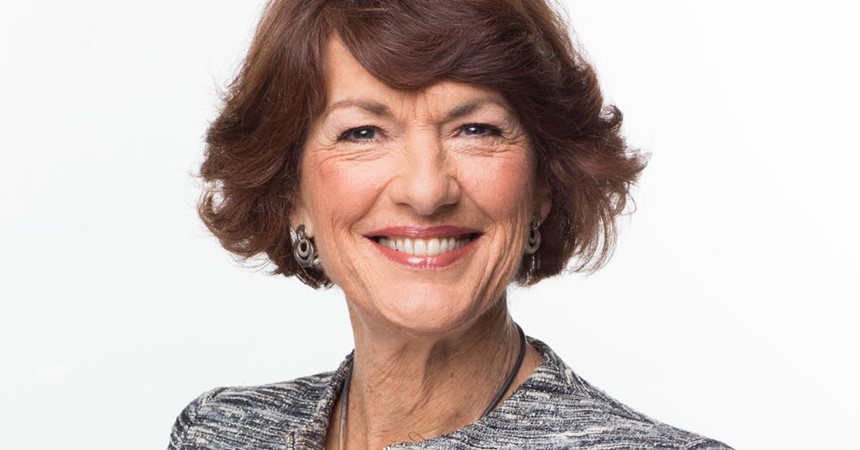TE Geraldine, you are a woman of many commitments and yet, in the midst of all that, there’s still room for the Church and for the faith that was part of your upbringing. Keeping that space must be challenging ‒ why bother?
GD That’s a question I’ve wrestled with … as one of my friends said the other day, “It’s been a bad church.”
I bother because it’s been part and parcel of my identity development and I really have liked the church culture that’s been inculcated into me. I critique it, but I know it’s really mattered to me and it’s helped me cope with life. I think there’s a vacuum in ‘meaning provision’ for my children and grandchildren and that worries me. The idea that the church might seriously vanish ‒ or become so depleted that it’s a ‘bonsai church’ ‒ that would be a real loss. The idea that an Australian community (let alone an international community) without a really solid input from the Catholic Church would be a casualty-free zone, and might be an improvement, is nonsense. I'm waiting for people to work out that we need a healthy, forward-thinking, hope-filled Catholic Church to contribute to society. Quite frankly it’s a self-interested longing – essentially, we can’t just let it go.
TE What might a healthy, hope-filled church look like?
GD It would have a much greater role for the laity. Something I’ve felt for quite a while is that we lay people have been ambivalent about whether we really want to step up ‒ and a lot of us are just fully stretched already… We have to acknowledge that we haven’t done anything like the Anglicans or other Christian denominations; we’ve left it to the clergy and now we’re finding there was a tremendous price to pay for that.
I would like far more of a sense of joining in where people are in their lives, offering hope to modern people who I think are truly questing to live a good life. Modern Jewish communities are putting into practice the idea of ‘belonging before believing’ ‒ I think we’ve probably emphasised ‘believing before belonging’. We’ve prioritised doctrine and defined ourselves by what we believe ‒ something’s going wrong there. The nature of relationship, welcome, hospitality, that sense of offering some roadmaps to real people ‒ all of that’s important. I’m not just about saying ‘yes’ to everything ‒ but perhaps there’s room for a subtle shift towards an emphasis on virtues, codes that are helpful for people to reflect on so that they do feel that there is such a thing as a meaning-filled life which has guts, if I can put it like that.
TE I can't help wondering if you've found a healthy, hope-filled community in which to worship?
GD I have! Yes, definitely … a good community. I could be more involved, but I am going along to one of the Lenten discussion groups. I wouldn’t mind having a discussion group around The Tablet but I haven't the time and I'm not going to start something I can't do properly!
TE How have the revelations of the Royal Commission impacted on your commitment?
GD To say it's devastating is an understatement.
To say it’s bewildering is an understatement.
To say that shame appears to be the most appropriate response is the impression that springs pretty fast to mind.
However, I went through my worst times about five years ago, before the Commission started ‒ I experienced a real nadir. I felt that the Good Shepherd had been completely laid aside. How can this have occurred? The Ellis case, too, was disgraceful, whereas the Ballarat and Newcastle stories were just hard to process. Yet I also did find myself pondering things like proportionality…I know in my conscience that I just did not know, growing up as a Catholic, that this was occurring. What does one do about being part of a broader group where you had no idea this was happening? I might have found lots of folly and annoyance in the clergy and the nuns whom I dealt with, but I found a lot of goodness too.
I’ve been wrestling with the huge numbers of Catholic schools doing very good work; the fact that the Catholic Church is the largest provider of welfare other than the government, that’s real. I feel quite strongly that a lot of the angriest people ‒ leaving aside the victims who feel immensely betrayed ‒ don’t want to know that goodness can sit in the same vicinity as depravity; that’s the troubling paradox. I’m still asking myself the question: how does one sort out the appropriate judgement, acknowledging both the goodness and the horrors?
In the really bad days of the Royal Commission I went to talk to my parish priest, thinking he’d be feeling pretty low ‒ but he wasn’t! He knew how many people were coming to him wanting to be married in the church, wanting instruction, wanting their big life rituals to be celebrated in the church so he wasn’t demoralised.
TE As a capable woman, is it frustrating for you that the opportunities for women to engage meaningfully in church decision-making are still so limited?
GD ‘Yes’ is the simple answer ‒ but I refuse to devote too much attention to getting annoyed about it. I have my own thoughts and plans about new entities to be set up by lay people ‒ nothing to do with the bishops and not needing an imprimatur. I just want to get on with it and not let frustration and anger rob me of oxygen. (That's because I’m not looking to get inside the Church!)
We need to own the idea that we're heading towards a time like that in the very early Australian church. After all, we really had no priests for just on 30 years and the faith was very much kept alive, in a very relational way, by exemplary lay people … that's where I want to put my energy, thinking about that, trying to get other people involved, people with enough money and energy to set things up because you need people with means if it’s not going to fall over with the first whiff of wind … it's got to be substantial, not precarious, otherwise it does not exhibit hope.
So I don't waste my time being annoyed, it's just too enervating.
TE You’re someone who talks about virtues. Are there particular virtues you try to inculcate in your children and grandchildren?
GD I really believe in hope, but I feel these days it’s almost become the purview of idiot-optimists when it’s much deeper than that. It needs to be modelled realistically ‒ that's the work of life. You don't get terminally set back, you do find a purpose which is not just blind optimism and you trudge on because you're not in despair. Despair is the real accompaniment to cynicism which has become very ‘vogue’. It really bugs the life out of me that a lot of older people who had been encouraged to have hope now seem to think it’s an optional extra and that young people will cope - and they won’t! We wonder why so many of them are swinging in the breeze!
Also, humility ‒ the older I get, the more interested I am in the true understanding of humility. I used to think it was frightful meekness ‒ we were encouraged to be meek and humble of heart ‒ how dreary! But as I grow older, sit in institutions like the ABC and watch the Catholic Church, I realise humility is such an important element of leadership. You accompany others and humbly reassess your own abilities time and time again. You sally forth ‒ with all your misgivings and shortcomings – the ultimate test of faith!
TE Virtues are things we choose to try to inculcate; we don’t get it right all the time, but we persevere; but with rules ‒ you break them or you keep them, it’s very black and white, and the church has been very rule-oriented.
GD Yes, there’s a brittleness about rules, strangely enough… We live in a time of massive change, we’ve been through a digital revolution, like the industrial revolution, we have to forgive ourselves a little bit. I say to people, you’re doing your best, it won’t be perfect, but don’t let the best be the enemy of the good. That’s one of my mantras, along with perseverance.
I try to invite people to see the Tradition as a wonderful cultural, spiritual, meaning-filled inheritance; to reflect upon that, to be taken into the wonder of being alive. That to me is what being introduced to the virtues does for you. Apply it to your life! You realise a lot of young parents are raising their children so conscientiously but opting for very small communities they can absolutely trust…and I understand why, but as you get older you realise that the line Hillary Clinton used to sprout was right, it does take a village to raise a child. The tribe had its problems but it did provide that sense that the children belonged to more than their own concentric circle ‒ which does confer deep, long term confidence I sense.
TE Talk to me about doing less and being more.
GD I was sent a book, Do Less Be More by Susan Pearse and Martina Sheahan…and I thought, oh, another self-help book…but it is more than that I think. It’s written by two thoroughly modern women who provide lists for you to check yourself to see if the busyness is taking you over. People say, “How are you? Are you busy? Good.” The notion that to be busy is to be good ‒ what?! One of the questions they pose is, “Do you wake up in the morning and instantly think ‘What do I have to do?’” That was me. We’ve swallowed a nonsense I think, that busyness is next to godliness.
I have a lot of stamina, I enjoy people and they do ask a lot of me ‒ and I'm blessed to be asked. It can be flattering but last year I knew it had gone awry so I’ve tried to pull back to focus more… People say to me, “You must be TERRIBLY busy… Now I say, “I'm never too busy to say hello.” It’s a work in progress and I’m trying to find other answers…
TE Do you have any thoughts on the #MeToo movement?
GD It’s an extraordinary moment we’re living through…I would say two things.
I don’t like anything that lacks mercy. I think one of the great yields of my faith Tradition is the quality of mercy ‒ central to our justice system, central to trust, central to moving on; the whole idea, the genius of Christianity, that you can in effect reinvent yourself. I don't want us to revert to a super punitive ‘stuck fast’ way ‒ I don’t ever want to be part of that society.
Secondly, the idea that women might be cast, not straight away but eventually, as wowsers. If you have any knowledge of Australian history, you know that’s not a good place to be. It could backfire and I don’t want us to slide into that cliché, so we have to watch ourselves, while also struggling to make sure the codes and attitudes that need to shift, do so.
You can hear Geraldine Doogue speak at the annual TWEC Dinner on 21 May. Her topic will be “Beware the Distractibles ‒the Art of Perseverance”. To learn more, P Sharon 4979 1134 or E Sharon.




























































































